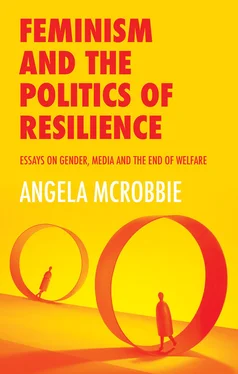In Chapter 4, I more fully interrogate the landscape of poverty-shaming, looking specifically at Reality TV, where I also pay attention to racializing logics, which append whiteness at that point at which working-class women lose the privilege of being deemed without race on the basis of their downward mobility. The figure I consider, who starred in the series Benefits Street , was named White Dee to differentiate her from her friend and neighbour, who was black (Dee Samora). The programme demonstrates so many of the microscopic tensions and contradictions of popular culture to which I referred in note 2 of this introduction. Even as she is shamed, White Dee embodies proud, unbowed working-class femininity. She asserts herself as someone with moral capacity supporting her neighbours by escorting them to hospital or helping them with benefit problems. She also challenges the stereotypes of the welfare scrounger heaped upon herself and her neighbours by the tabloid press and by wider audiences providing online comments. Following through on the politics of race within debates on welfare, I conclude the chapter by referencing the work of so many black scholars who have drawn attention to the positioning of black people as outside welfare in its entirety and seen as undeserving subjects, whose labour is nevertheless required in order for the welfare apparatus to operate for the benefit of white British society. This racial logic of the British welfare state forces a rewriting of any even vaguely rosy account of the achievements of social democracy in this respect, forcing also reconsideration of the times of the so-called ‘affluent worker’ (Shilliam 2018; Virdee 2019).
I end this book with some brief ruminations on social polarization and the intensification of poverty, which are all but disguised by the emphasis, now so firmly established in the popular imagination, on welfare cheats and benefit ‘scroungers’. Arguably women who do rely on benefits, in or out of work, now find themselves more emphatically symbolically incarcerated than was the case in the past. The precarious lives they are forced to lead must be done so without the trained advisers and support workers who might have been able to utilize a non-stigmatizing vocabulary, which was in place from the mid 1970s, before being replaced by the new system of public management some twenty years later. Thus, we see neoliberalism proceed by multiple processes of substitution and displacement. Kinder words and more equal encounters are edged out of social interactions with vulnerable sectors of the population. Spaces, 5images and words are made to comply with the requirements of the boundary-marking practices that enforce stricter social polarization, giving rise to new forms of daily antagonism and aggression. To undo this whole terrain of everyday life and institutional culture, feminist scholars and activists would need to imagine a new and quite different social field predicated on reparative and restorative welfare and a municipal commons comprising public spaces that would counter the incarceration effect. Alongside this we might also envisage forms of media and popular culture that would refute the genres which currently continue to degrade those who have suffered from the intensification of poverty.
1 I draw loosely on Foucault and Wendy Brown here, understanding neoliberalism as a form of governmental rationality, which, coming forward to pervade the UK polity in the Thatcher years, applies the rules of the market to the major social institutions of Western capitalist society, urging privatization of state assets (Foucault 2006; Brown 2015). This ethos is also concerned with bodies and populations who are encouraged not just to envisage themselves as human capital but also to develop an entrepreneurial attitude towards the self, which means bolstering personal conduct so as to maximize assets and audit the self with the help of various monitoring devices designed to enhance competitiveness. Neoliberalism sweeps across the terrain previously associated with social democracy, including welfare, organized labour, education and social care sectors, stripping them bare and proposing instead various entrepreneurial, innovation and leadership programmes. 2 I take my lead here regarding the definition of popular culture, rather loosely reworking both Stuart Hall and Raymond Williams, as symbolic practices, which retain vernacular elements of belonging and identity from subordinate social groups, classes and minorities, while at the same time providing fertile ground for the global entertainment and media industries able to extract and leverage maximum value from seemingly authentic affective and emotional expressions and investments. The formal qualities of popular culture are massified and commodified. Participation is managed and calibrated through algorithmic demographics of audiences, populations, participants, users or consumers. Little remains of potential for struggle, posing new challenges to scholars of ‘pop culture’. 3 Aired through February and March 2019. 4 The popular Victorian image of the ideal wife/mother came to be known as the ‘angel in the house’. She was expected to be devoted and submissive to her husband, while creating a beautiful home, so that he would have no reason to seek pleasures elsewhere. 5 Here we might point to the increasing privatization of housing and play spaces in the London property market. Attention has been drawn to the phenomenon of the ‘poor door’ in developments where social tenants are forced to enter the building through an unlit alleyway back door and without the trappings of a well-designed entrance hall. More recently, groups of women have revealed playground rules that bar the children of social tenants from the bigger and well-planned space allocated for the children of those who own properties in these new-build developments.
Конец ознакомительного фрагмента.
Текст предоставлен ООО «ЛитРес».
Прочитайте эту книгу целиком, на ЛитРес.
Безопасно оплатить книгу можно банковской картой Visa, MasterCard, Maestro, со счета мобильного телефона, с платежного терминала, в салоне МТС или Связной, через PayPal, WebMoney, Яндекс.Деньги, QIWI Кошелек, бонусными картами или другим удобным Вам способом.










